Gandhi

WHEN VILLANOVA PROFESSOR Vincent W. Lloyd reflects on the theology of the phrase “Black Lives Matter,” he begins with the “death-dealing forces of white supremacy” and the tragic “ vulnerability to premature death” experienced by Black people. But Lloyd doesn’t stop there. To affirm the value of Black lives, Lloyd writes, requires life that is rich, creative, and flourishing.
Lloyd doesn’t think such flourishing is possible without faith. Specifically, he argues that to hold on to “a hope against hope” in the face of these noxious, murderous systems and practices requires belief in the possibility of life after death: “For Black life to matter,” Lloyd writes, “we must believe in resurrection.” As Carmen Acevedo Butcher puts it in her interview with Betsy Shirley, “It may not look like it,” but “Love’s in charge.” That’s an important reminder for all of us, in this Easter season and always.
On a lighter note: We’re pleased to have a guest appearance by our former art director (and humor columnist) Ed Spivey Jr., who came out of retirement to offer his pearls of wisdom on artificial and other kinds of intelligence.
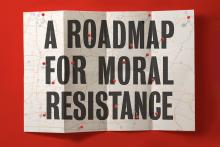
THE RIGHT TO VOTE, a foundation of our democracy and a fundamental attribute of citizenship, is under serious threat. In recent years, attacks on the integrity of the electoral system—the gutting of the Voting Rights Act, disinformation campaigns, foreign interference, and more—have weakened its overall infrastructure and cast doubt upon its results. Now we’re seeing repeated attempts, through propaganda and other means, to further undermine the system and discredit in advance the results of the 2020 election.
The president has attempted to co-opt real concerns about the upcoming election, claiming without evidence that it might be “stolen” as a result of fraud tied to vote-by-mail. His efforts deflect attention away from the ways that voter suppression efforts already underway pose a real danger, both to people seeking to exercise their hard-won right to vote and to the integrity of the electoral system itself.
As many have pointed out, there are numerous ways internal or external forces could call the results of the election into question: declaring a state of emergency that disrupts voting, delaying Election Day, interference by hostile foreign powers, tampering with voting machines or databases, and more. All of these represent legitimate threats, but perhaps the most likely scenario is that rampant voter suppression tactics impede enough voters in key battleground states to alter the presidential election outcome and which party controls Congress.
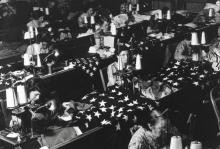
Bourke-White traveled the world in search of complete stories: from Depression-era Hooverville to partitioning India to Apartheid-era South Africa to Nazi Germany. She became the first female war photojournalist and the first photographer for LIFE. After surviving a helicopter crash and getting stranded in the Arctic, Bourke-White’s colleagues declared her “Maggie the Indestructible.”
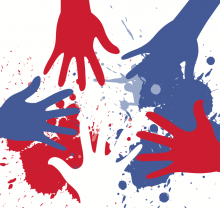
Listening to several Fourth of July discussions last week, I was struck by how many people think of freedom as the ability to do whatever they want. They think there should be few, if any, restrictions on what they choose to do or what they want to own.
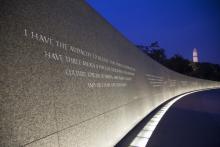
Prophets are always asking questions. Tough questions. Unsettling questions. Questions that they pose to themselves, then try to answer by how they live.
Questions such as:
What’s in our hearts? Are we concerned too much about ourselves and too little about others? Do we believe in love? Why do we give in so readily to bitterness and hatred?
Why do so few have so much, while so many have so little? Aren’t we all diminished by the poverty, discrimination, violence, and the various injustices in our world? Why do we glamorize violence and weapons as solutions to our problems?

To join Jim Wallis in prayer and fasting, click here.
I was grateful to be at the beginning of the Fast for Families on November 12. Courageous leaders from many communities were making an incredible sacrifice to remind our leaders what is really at stake in the fight for immigration reform. It was an honor to commission the core fasters, such as my Sojourners’ colleague Lisa Sharon Harper and Eliseo Medina, a veteran organizer and a disciple of Cesar Chavez, by placing crosses around their necks as they began abstaining from food.
After 22 days, the core fasters had grown weak, nearing the point of medical danger. When they decided to pass the fast to a new group, I was humbled to join the effort this way. On Tuesday, in the shadow of the U.S. Capitol, I received the cross from Eliseo that I had given to him three weeks before.
At Tuesday’s ceremony, each of us shared why we were committing to this discipline and willing to subsist only on water for various lengths of time.
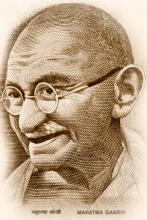
MARTIN LUTHER KING JR. once said that the greatest Christian of the 20th century was not a member of the church. He was referring to Mohandas Gandhi. A remarkable number of King’s fundamental beliefs—the use of active nonviolence as a tool of social reform, the commitment to loving one’s enemies—can be traced back to the influence of Gandhi, which means that one of the defining figures of 20th century American Christianity was profoundly shaped by the example of an Indian Hindu. As King said in 1958 of the civil rights movement, “Christ furnished the spirit and motivation while Gandhi furnished the method.”
But what of Gandhi’s influences? How did a skinny, middle-class, mid-caste Indian, so scared of public speaking as a student that a classmate had to read his speeches aloud for him, come to lead one of the great liberation struggles of the past century? A new book by Arvind Sharma, professor of comparative religions at McGill University, makes the case that the source of Gandhi’s strength was his spirituality. And while the heart of Gandhi’s faith was Hindu, as King’s was Baptist, the influences were remarkably diverse.
Pointing out that most of the biographies of Gandhi really tell the story of Mohandas Karamchand (the name he was given by his family), not Mahatma (a title that means “great soul” and is given to saints in India), Sharma’s book Gandhi: A Spiritual Biography sets out to give an account of the Mahatma. Sharma quotes Gandhi directly on the importance of highlighting the dimension of spirituality in any attempt to understand him: “What I want to achieve—what I have been striving and pining to achieve these 30 years—is self-realization, to see God face to face, to attain moksha [the Hindu term for liberation]. I live and move and have my being in pursuit of this goal.”
ON A BLAZING August day last summer, Rosa Pérez Triana faced a crowd of several hundred people in downtown Tucson and held up a color photo of a pretty young woman.
“This is my daughter, Coral,” Pérez said in Spanish, her voice breaking. “A year ago she went missing. There are thousands of people in Mexico like me who don’t know what happened to their loved ones.”
A middle-aged woman from the violent state of Nuevo León in northern Mexico, Pérez had come to the United States with the Caravan for Peace with Justice and Dignity to tell her North American neighbors what had happened to her daughter—and to an estimated 80,000 other Mexicans who have been killed or disappeared during the country’s six-year-old war on drugs.
Her daughter’s story is typical. Guadalupe Coral Pérez Triana vanished on July 24, 2011, somewhere on the road between Reynosa, Tamaulipas, and Monterrey, Nuevo León. Five other young women were traveling with her. All are missing and presumed dead.
“The main purpose of the caravan is to show a human face,” explained Laura Carlsen, director of the Center for International Policy’s Americas Program in Mexico, who joined the caravan on its last leg through the East Coast. “These are people whose family members were victims.” Such are the human costs of the war on drugs that the U.S. government supports with arms and money.

Something called a GiveBox appeared
this fall on Falckensteinstrasse, and my first gift
was a memory: Dorothy Day, decades ago,
gently quoting St. Basil to me: If you have two coats,
you've stolen one from the poor.
Like a walk-in cupboard on the sidewalk, brightly
painted, decked out with flowers, this GiveBox
is for the anonymous exchange of gifts.
Ever since the global financial cabal drove the world's economies into a ditch, popular movements have been rising up to fight "austerity measures" that exact punishment on the poor and leave the rich untouched. This is a familiar biblical meme for the definition of injustice. The words of the prophet Jeremiah come to mind: "Your clothes are stained with the blood of the poor and innocent" (Jeremiah 2:34).
"When Spanish mayor Juan Manuel Sánchez Gordillo recently led farmers on a supermarket sweep, raiding the local shops for food as part of a campaign against austerity, his political immunity as an elected assembly member protected him from arrest. He now asks other local mayors to ignore central government demands for budget cuts and refuse to implement evictions and lay-offs. In this era of austerity, such flagrant disrespect for the law ought to be encouraged. Sometimes, the greatest strength of popular movements is their capacity to disrupt. So here, for the benefit of imaginative indignados, are five examples of civil disobedience:
Gandhi and the Unspeakable: His Final Experiment with Truth, by James W. Douglass.
On his radio show last week, Glenn Beck read a vow of nonviolence, which he said he'd been working on for about a year, and pleaded his followers to take it as well. The pledge itself is actually quite good, and even Gandhian, at parts. Here is an excerpt:
Today, quarters of the Earth are endangered by tyranny, discrimination, barbarism, and subjugation by fellow man. With an understanding of basic rights and equal justice, we must remain loyal to God and deliver the rights which [God's] benevolence has bestowed upon us to those who have been denied the blessings of liberty, justice, and equality. More importantly, we must protect them from being robbed in the future, so that forever the world may be safe, and her people free from malevolence. Together, we must be prepared to do our duty no matter the cost and we must do so inexorably. We must march forth steadfast and unconquerable and defeat the forces of evil not by sword, but through our love for mankind and his creator.
"My father was born by a river bed and left to die. My mother grew up in extreme poverty. They made it. I am their story, they inspire me!" These are the words of my new friend Rudo, an amazing young woman from Zimbabwe who has come through so much and has now been chosen to be one of a thousand ambassadors of the Make Poverty History Road Trip who next week are acting to make history.